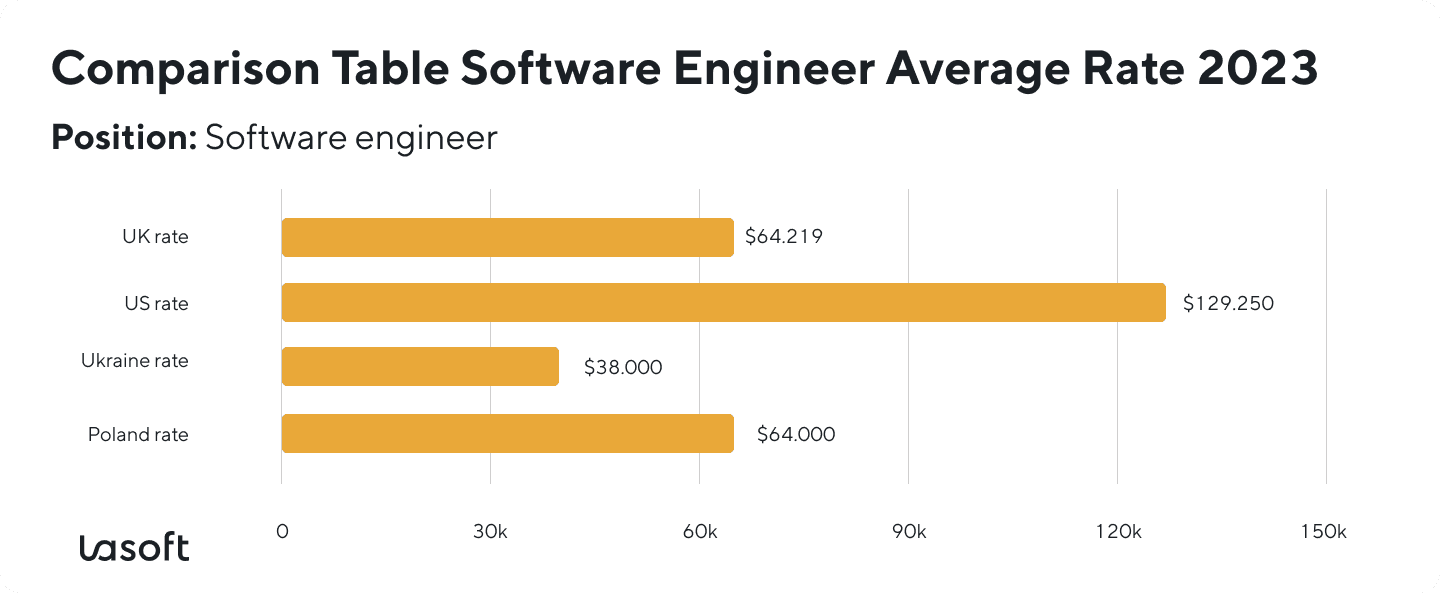The world has witnessed global competition for tech talents for the past few years. And the tendency is growing at a significant pace. The UK is at a pivotal moment in its technology sector, facing a daunting skills shortage in UK due to a global shortage of technology and science-skilled workers. However, the country also faces an “economically inactive people” phenomenon. As of 2022, 22% of working-age people in England, Scotland, and Wales were out of work and not looking for a new job. In 2023 and 2024, we observe more than 900.000 people economically inactive, per the Parliament UK report.
This UK skills shortage in tech poses significant challenges for businesses and the economy. But there’s also an opportunity to rethink talent acquisition and development strategies. Among the practical solutions, integrating nearshore teams is a promising approach to mitigating these challenges. However, it’s essential to understand the skills in demand and the potential hurdles of deploying nearshore teams in Great Britain.
Economic Inactivity
Report about the economically inactive population in the UK

Explaining the Global Shortage and the UK In-House Tech Experts
Data from the Netherlands-based human resources consultancy firm Randstad NV shows that as of 2016, there were around 3 million shortages of qualified employees in the US in technology and science fields. And according to Los Angeles-based management consulting firm Korn Ferry, globally, there will be a shortfall of over 85 million tech workers by 2030.
Tech Skills Shortage in 2023: data for the UK, the USA, and Globally

The need for tech expertise is growing, according to trends in the IT industry, but the skill pool is not keeping up with demand. The causes include:
1. A decline in the number of births. Japan and many European countries have experienced a demographic decrease in birthrates for many years.
2. Baby Boomers comprise over 25% of the labor force in the United States and are predicted to retire by 2030.
3. Many employees quit their jobs and change their lifestyles and views on what is important to them.
4. High-skilled occupations that younger generations haven’t had the time or training to take over are left behind as they retire and move out.
Many types of research report the situation in the UK tech labor market. For example, Forbes survey of 500 organizations, respondents identified four primary areas of concern, that cause the shortage of skilled tech talents:
1. Rapid technological improvements (42%), such as artificial intelligence, machine learning, automation, IoT, etc.
2. A lack of training opportunities (41%).
3. A need for more relevant educational programs (37%).
4. Competitiveness in the labor market (35%).
5. HR Manager factor: Many recruiting managers complicate their hiring process. They weed out many applicants and occasionally reject those who might fit an employer’s business well.
6. Employee turnover in the IT sector remains alarmingly high. Despite efforts to improve retention strategies and create a more attractive working environment, many IT professionals still choose to leave their jobs at a concerning rate.
| Key factors contributing to the IT skills gaps in the UK job market | Total answered, % |
|---|---|
| Rapid technological advancements | 42 |
| Insufficient training opportunities | 41 |
| Lack of relevant educational programmers | 37 |
| Competitive job market | 35 |
| Salary disparities between industries | 29 |
| Law attraction of IT careers | 22 |
| Other | 1 |
Source: Forbes
What Skills Are In Shortage in the UK vs the US?
The most in-demand skills worldwide are those related to data and IT. The digital transformation and emerging technologies market declare a need for more skills, particularly in machine learning (ML), artificial intelligence (AI), and business software development. These talents are in short supply both in the USA and the UK. Furthermore, there is a shortage of experience in data, engineering, security, and general IT.
What Top Skills Are in Shortage in the US?

What Top Skills Are in Shortage in the UK?

In 2024, machine learning and artificial intelligence will be highly valued competencies, as reported by two out of every five employers in the UK. The need for artificial intelligence specialists who can use technology to promote efficiency and innovation is growing. Although AI is the most in-demand skill for enterprises, cyber security, and IT support are two other crucial technology skills behind it.
How Can a Shortage of Tech Professionals Hamper Your Business?
A tech professionals shortage can hamper a business’s ability to innovate, compete, and protect itself in an increasingly technology-driven world.
Difficulties in filling vital positions: A shortage of technical professionals can make it difficult for companies to fill critical roles, especially those that require specialized skills. This can lead to project delays, hinder innovation, and affect the company’s competitiveness.
Increased competition for talent: Faced with a limited pool of qualified applicants, companies may compete fiercely with other companies for top technical talent. This can lead to a bidding war for employees, driving up salary expectations and overall labor costs. Rising personnel expenses may strain any business’s budget and hamper growth and profitability.
Inability to keep up with technological advancements: Technology constantly evolves, and companies must adapt and implement new technologies effectively. A shortage of skilled technical workers and professionals can affect a company’s ability to keep up with and stay abreast of the latest trends and innovations.
Increased cybersecurity risks: In today’s digital landscape, cybersecurity is a major concern for businesses of all sizes. A shortage of tech talent can leave companies vulnerable to cyber threats, as there may not be enough expertise available to implement robust security measures and respond effectively to attacks.
What Is British Businesses Outsourcing?
Many global IT hubs can now provide highly qualified and experienced experts who can provide tech products that are sometimes superior to what British companies can provide. The first step is utilizing talents and experiences that are highly in demand inside UK SMEs as newcomers keep entering the UK market and face the challenge of finding the required experts.
Total number of companies and startups in the UK
| Year | 2018-19 | 2019-20 | 2020-21 | 2021-22 | 2022-23 |
| Total number of companies in the UK | 4,202,044 | 4,350,913 | 4,716,126 | 4,894,356 | 5,116,743 |
| Startups | 672,890 | 665,495 | 810,316 | 753,168 | 801,006 |
Source: Gov.UK
Once considered a novel approach, outsourcing vs. nearshoring has become a successful trend for British businesses across diverse sectors and the global market in general. Businesses in the UK use business process outsourcing (BPO) techniques primarily for operations in the front and back offices. Back-office business process outsourcing is the practice of contracting out its core functions to outside experts committed to maintaining the smooth operation of the business. These experts include accounting, payment processing, IT services, human resources, regulatory compliance, and quality assurance. On the other hand, front-office BPO duties mainly involve customer-facing services like marketing, sales, and technical support.
Why Is the Nearshore Development Team a Solution for Business in the UK?
Now more than ever, closing the talent gap in the UK requires a combination of onshore and nearshore approaches. Hiring dedicated teams with highly skilled experts in Eastern Europe, such as Poland, Ukraine, Hungary, Romania, and the Czech Republic, allows in-house teams to fill the skill gap in areas that most require it. Let’s examine definitions.
What are the types of software outsourcing?
Offshore outsourcing: UK companies often outsource offshore to take advantage of lower labor costs in countries such as India, the Philippines, and China. Offshore allows companies to access a global talent pool while reducing operational expenses.
Nearshore development services: Proximity and cultural affinity make nearshore outsourcing attractive for UK companies looking to outsource certain projects or functions to neighboring European countries such as Ireland, Poland, Czech, or Ukraine. This model enables closer collaboration and faster feedback.
Onshore teams: It’s less cost-effective than offshore or nearshore alternatives and involves partnering with domestic service providers.

Why Nearshore Software Development Model Is the One That Can Solve the Tech Talent Shortage?
Concerning guaranteeing that nearshoring is “safe” in terms of quality and meeting deadlines, in-house management can effectively oversee external partners thanks to Agile tools, Zoom, and cloud computing. Those collaborative technologies make it simple to accomplish anything from deciding on contractual obligations to calculating operational KPIs.
You must carefully consider your nearshoring team by studying its cases and the skills it offers for your software project. Establishing successful communication channels, efficient validation procedures, and urgent feedback on your inquiries is vital. Coordinating all expectations, methods, and timelines from the initial interview through integration and daily tasks is vital.
The following is a brief summary of the values the nearshore software development team can have for your business:
1. Face-to-face communication with your nearshore partner is fine, unlike with an offshore team, as you have shorter flight durations.
2. Avoiding time zone differences can save your sanity and sleep at night. You or your managers won’t have to spend nights in Zoom adjusting your routine due to strange time zones.
3. Refrain from frustration with your home labor market and futile attempts to find tech professionals due to the tech skills shortage factor.
4. Each nearshore team has its own project manager with whom you can communicate. You can let them take the lead and be problem-solvers.
5. Free your in-house team or don’t hire extra personnel; this will cut development costs and boost ROI.
Top 10 in-Demand Jobs and Skills in the UK’s Tech Sector
Project Managers
.Net Developers
C# Developers
Software Engineers
Infrastructure Engineers
IT Support Engineers
Senior .Net Software Engineers
IT Managers
IT Security Trainees
IT Support Technicians
Source: Digit.Fyi
Comparison Table: Software Engineer Average Rate 2023

Why LaSoft is Your Nearshore Partner: Case Study with the UK client
We want to present the LaSoft team as your dedicated nearshore partner. With nearly a decade of expertise, the team has clients from the UK, the USA, Canada, the Netherlands, and Israel. Since 2014, our team has finished 85 different online projects.
As of 2022, we have a significant workforce and an office in Łódz, Poland. Over 30% of the company’s operations are based in Poland, and we continue expanding. We also have representative offices in Switzerland, the United States, and Ukraine.
For the P4BeSpoke app project, we have made a Discovery, which is an essential stage if you want to validate your software business idea. The client planned to create an app that would allow users to receive online fitness coaching.
During the Discovery stage, our team explored the niche of fitness app development. Our analysis revealed a growing demand for health and fitness applications. We use a user-centric design approach, ensuring all features and interface elements are made with the user’s needs and preferences in mind. For the P4BeSpoke app project, we created a plan, user flows, user stories, and a project roadmap to construct a practical and effective digital solution.
Final Insights
Nearshore outsourcing , as an answer to the IT talent shortage in Europe and the UK, has the potential to be a very cost-effective way to outsource services over time. However, there are a few things to think about when developing software remotely. You may choose the ideal vendor for your company by considering the local language, time zone, location, and price.
Above all, you should thoroughly review a technology company’s portfolio and previous activities to see if it has the expertise to satisfy your needs. The last, but not least, having clear communication is essential to the collaboration’s success.
FAQ
What is the digital skills gap in the UK?
The digital skills gap refers to the disparity between the demand for skilled professionals with expertise in digital technologies and the available workforce possessing these skills. In the UK, this gap has become increasingly noticable as businesses across various sectors undergo digital transformation, relying on technology to drive innovation, productivity, and competitiveness. Despite the growing demand for digital skills, there is a need for more qualified professionals to fill critical roles, leading to challenges in recruitment, talent retention, and workforce development.
Is there a shortage of IT professionals?
Yes, there is a skills shortages in the UK, with employers often needing help finding candidates with the technical skills and experience to fill vacant IT roles. This shortage spans various domains within the IT sector, including software development processes, cybersecurity, network administration, cloud computing, and data analytics. The demand for IT professionals is driven by factors such as the increasing reliance on technology across industries, the proliferation of digital transformation initiatives, and the rising threat landscape necessitating robust cybersecurity measures.
To address the tech skills shortages in the UK and get a larger talent pool, employers may need to adopt strategies such as offering competitive salaries and benefits, providing opportunities for continuous learning and professional development, embracing remote work options to access talent beyond geographical constraints, and cultivating inclusive and diverse workplace cultures to attract a broader pool of candidates.



